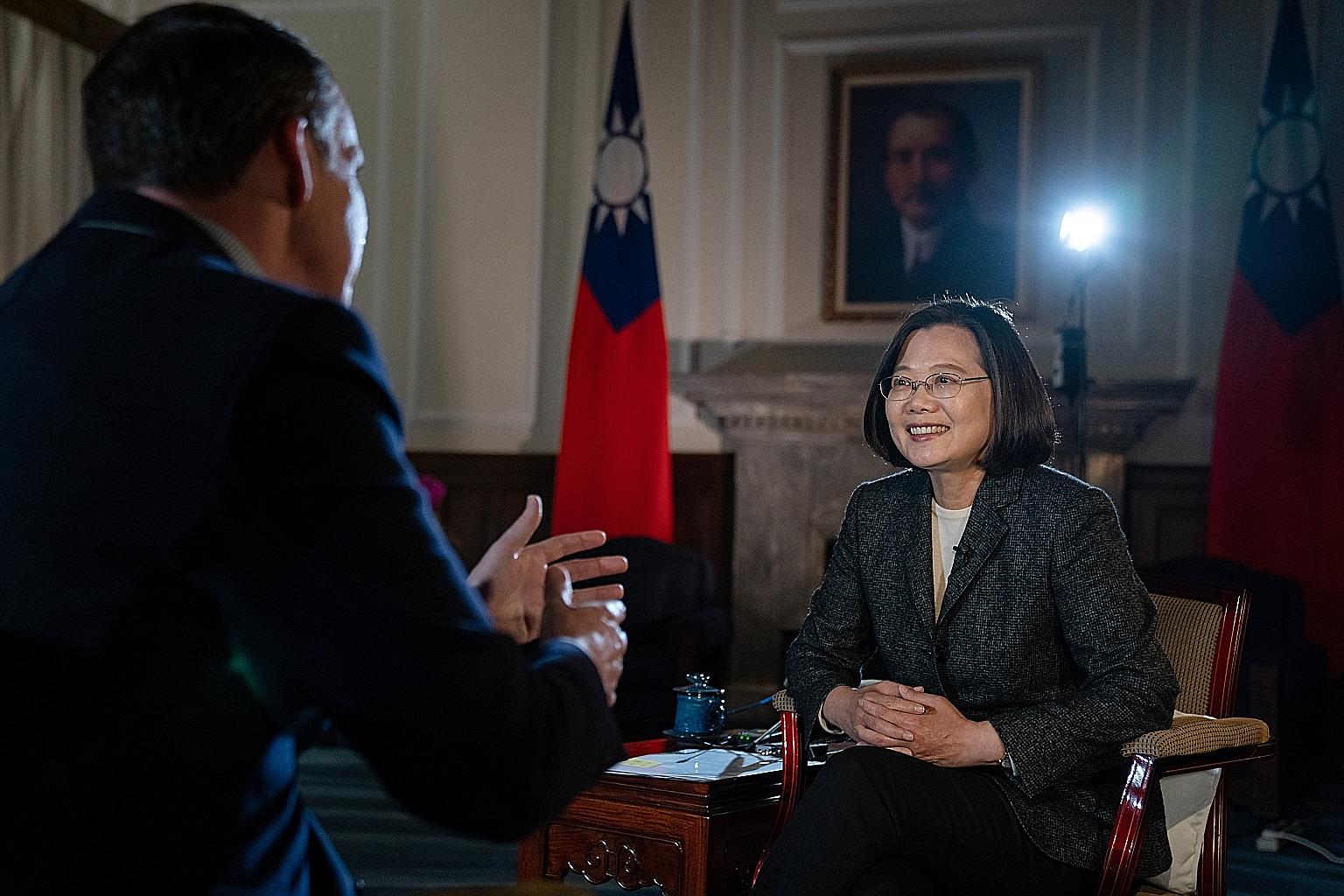Tsai Ing-wen urges Beijing to reconsider Taiwan policy
She calls island an independent country in first interview after landslide re-election victory
Sign up now: Get insights on Asia's fast-moving developments

Taiwanese President Tsai Ing-wen being interviewed by BBC correspondent John Sudworth in Taipei on Tuesday. In the interview, she described her victory in last Saturday's election as a "strong message from the Taiwanese people" about how fed up they were with China's constant threats to unify the island.
PHOTO: EPA-EFE
Just days after securing her re-election in a landslide victory, President Tsai Ing-wen has called on China to reconsider its current Taiwan policy, saying the island is an independent country.
She also said Taiwan does not need to formally declare its independence.
"We are an independent country already and we call ourselves the Republic of China, Taiwan," said Ms Tsai in her first post-election interview with the BBC on Tuesday.
Comments along such lines have enraged Beijing.
Just hours after her interview, China's Cabinet-level Taiwan Affairs Office (TAO) said that Taiwan's future should be decided by "all the people of China".
"It's difficult to shake a mountain, (like) it is to shake the '1992 Consensus'," said TAO spokesman Ma Xiaoguang in the organisation's first post-Taiwan election media briefing yesterday.
Mr Ma was referring to the tacit agreement between Beijing and Taipei that there is "one China", with each side having a different interpretation of what that "one China" means.
"No matter what the outcome of the election in Taiwan, our policy on Taiwan will not change," he said.
"No matter how the political situation in Taiwan changes, the peaceful development of cross-strait relations is still the voice and public opinion of the majority of Taiwan compatriots on the island.
"On the contrary, if cross-strait relations are damaged, the situation in the Taiwan Strait will be turbulent, and the interests and welfare of Taiwan compatriots will be damaged," he warned.
Mr Ma also said that there will be no space for any form of "separatist activities".
"We have a firm will, full confidence, and sufficient ability to thwart any form of Taiwan independence secessionist scheme. We will never allow any person, any organisation, any political party, at any time, or in any form, to split any piece of Chinese territory," he said.
Taiwan's "perverse actions" had also forced increasing calls within the mainland to retake the territory by force, he added.
While Taiwan has been governed separately from the mainland after a civil war ended in 1949 when Kuomintang forces defeated by the communists fled to the island, China continues to regard it as a wayward province, which must be taken back - by force if necessary.
The TAO's rebuttal was in response to Ms Tsai's comments in her victory speech last Saturday, when she said one of the four pillars of establishing peaceful talks with China is to allow Taiwanese people to decide their own fate.
The other three principles are peace, parity and dialogue.
"We're a successful democracy, we have a pretty decent economy... We deserve respect from China," Ms Tsai told the BBC.
The ball is back in China's court to break the ice on cross-strait ties, she noted. "I think it's for the Chinese to have this preparedness to face the reality," said Ms Tsai, partly referring to her own re-election by some eight million votes, the highest number a presidential candidate has ever received in Taiwan.
"If they are not prepared, whatever we offer won't be satisfying to them."
She said her victory is a "strong message from the Taiwanese people" about how fed up they were with China's constant threats to unify the island.
In a retort to critics who have said her stance is needlessly provocative, Ms Tsai said she has shown restraint.
She has, for example, stopped short of the formal declaration of independence - amending the Constitution and changing the flag - that some in her pro-independence Democratic Progressive Party would like to see.
China has warned that any move towards formal independence would be regarded as a pretext for military action.
"There are so many pressures, so much pressure here that we should go further," she told the BBC. "But (for) more than three years, we have been telling China that maintaining a status quo remains our policy... I think that is a very friendly gesture to China."
Ms Tsai said she is, however, planning for all eventualities.
"We have been trying very hard and making a lot of efforts to strengthen our capability," she told the BBC.
"Invading Taiwan is something that is going to be very costly for China," she noted.
Ms Tsai also held a press conference yesterday, announcing plans to keep her current Cabinet and elaborating on the Anti-Infiltration Act, which took effect yesterday.
Passed by the legislature on Dec 31, the law aims to curb political donations, lobbying and election interference by "external hostile forces", particularly interference from China.
• Additional reporting by Elizabeth Law


